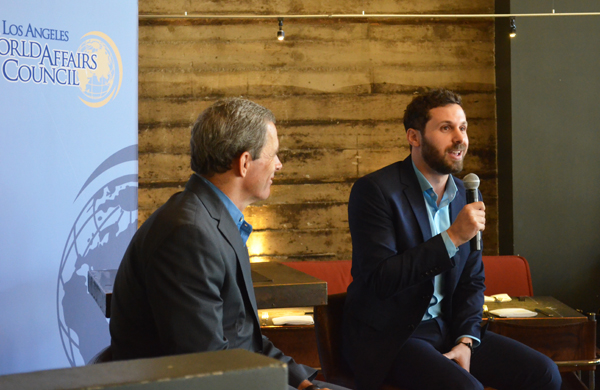
Zak Dytchwald (right) addresses attendees at a LAWAC Global Cafe breakfast.
The biggest difference between young Chinese millennials and their parents’ and grandparents’ generations is “open-mindedness”, according to Zak Dychtwald. In the last ten years, outbound tourism from the US has grown by some 30%, but in China over the same period it has grown by 622%. China is now the single largest outbound tourism market in the world, yet only 4% of Chinese have passports. “This generation has such curiosity,” Dychtwald told a LAWAC Global Café breakfast on April 18th. He quoted a very brief resignation letter written by a young woman who was fed up with her job that subsequently went viral across China: “The world is so big, I want to see it for myself.”
Dychtwald graduated from Columbia and headed to China in 2012, barely knowing any Chinese. For four years he studied hard, made mostly Chinese friends and then produced a book on Chinese millennials that shows what ordinary young Chinese men and women want, how they see themselves and the world around them and why their concerns are not what Americans might imagine.
Young Chinese do indeed want to be free, he said, but they are not looking for political or democratic freedom. “They want to be free to be themselves, to stand out from the crowd,” he said. They understand that their internet is censored, but they don’t worry too much about that. For them, according to Dychtwald, they wanted “freedom from pressure”, by which he meant the pressure to do well in exams, to get into a good university, to get a good job, to earn enough to buy an apartment so they can get married and then have a child to satisfy their family obligations.
Dychtwald said that this younger generation was absorbing enormous amounts of information from overseas, particularly from America – one third of all overseas students in the US come from China. There are 300 million English speakers in China and barely 1 million Chinese speakers in the US. “And the idea that China can’t be creative? That is something we keep telling ourselves so we can sleep better at night,” he said, pointing to the vast array of technology startups in China that are making many Chinese rich beyond anything their parents could have dreamed of.
He said that young people see their government is flawed, but at least it is “effective”. Modernization in China “does not mean Westernization.” He said that young people see the government like the weather, “You can prepare for it, you can predict it, but you can’t change it.” By the same token, they have expectations from their newly powerful state. While their parents did not think China could be a world leader, the younger generation, who have grown up not knowing hunger or material deprivation, have come to expect China to be a world leader.
China has also been undergoing a quiet sexual revolution. Whereas premarital sex was almost taboo in the era of Tiananmen Square in 1989, today it is far more widely accepted, as is LGBT culture. China now has the largest online dating service for gay men in the world.
Overall, Dychtwald said, China is changing rapidly and becoming more globally conscious, even if it is not the way the US might have wanted or predicted. “This young generation is really driven to see a world their parents weren’t allowed to see.” And increasingly the US is now having to come to terms with this “rejuvenated” China.
